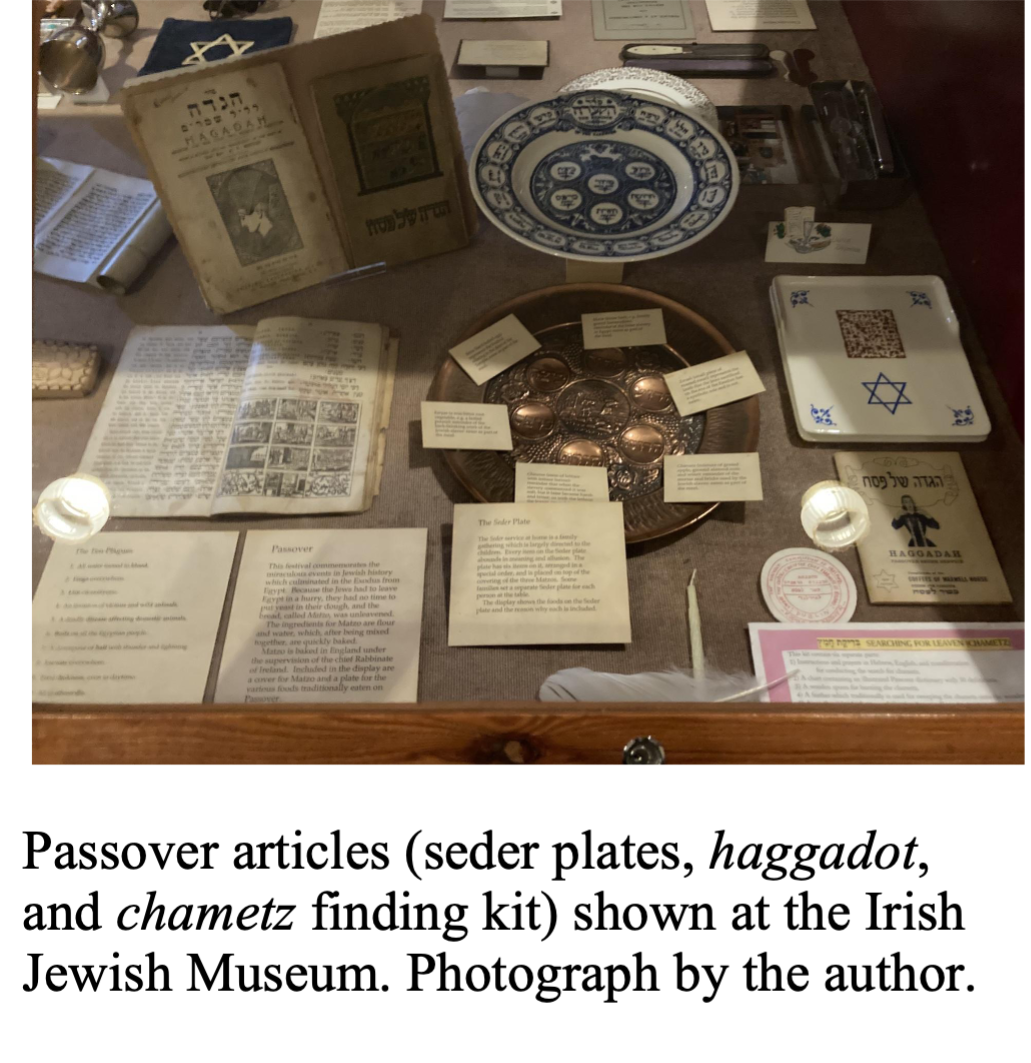Fish Consumption and Human Culture in the Anthropocene: A Case Study of the Jewish Community in Ireland
Hannah Feldman
How do humans, as non-underwater beings, access the ocean? One tangible way is through the extraction and consumption of marine resources, often mediated through cultural practices and matters of human taste and preference. With our dietary habits and fish-eating, we impact the ocean. Through this, the ocean makes its way inland into human lives, homes, and habits. However, this consumption and extraction is often boiled down to a matter of quantifying human use of the marine environment, rather than analyzing how marine life and marine environments have come to bear on human history and culture, and how the marine world intertwines with the world of human cultures.(1)
In Ireland, the relatively small Jewish community serves an interesting case study of the intersection of the ocean and culture through human foodways. Per Claudia Roden, fish has historically been an easy staple in some Jewish food cultures—she notes that fish are kosher if they have scales and fins, and that fish meat, unlike other meat, does not need to be specially koshered in the same way and does not need to be constrained by the rule against mixing meat with dairy.(2) Perhaps due to this (or any other number of reasons), the Jewish community in Ireland has a deep historical relationship to fish and fish eating. In the early 20th century, the Irish Jewish community was noted to have had a strong relationship to fish, and likely had much higher rates of fish consumption compared to their non-Jewish neighbors.(3) In Jewish Ireland in the Age of Joyce: A Socioeconomic History, Cormac Ó Gráda has discussed the strong connection between Irish Jews and fish in the early 20th century and the present.(4) He cites specifically the memories of Jewish Dublin residents recalling the fresh fish, pickled herring, and smoked salmon available in Jewish homes and shops.(5) In Dublin, Jewish families often bought fish on Clanbrassil Street on Friday mornings and on Saturday evenings and Sunday mornings before and after Shabbat.(6) Ó Gráda quotes Philip Rubinstein, a butcher, recounting the bustle of female fish-sellers on Clanbrassil Street and shoppers buying fish and meat from his store after Shabbat during those times.(7) In Dublin, these fish-sellers and food stores were the place where Jewish Dubliners bought their piscine household staples. In this way, through the rhythms of daily and weekly life, Irish Jews engaged with the ocean and its reverberations on the land.

Today, members of the Irish Jewish community are still connected to fish, though new anthropogenic developments have tempered those developments, namely politics. A member of the Jewish community in Dublin and a volunteer at the Irish Jewish Museum that I spoke to described the impact of terrestrial government policies on the Jewish community’s consumption of fish in recent years—according to this community member, many in the Irish Jewish community now rely on fresh fish, as Brexit has made it more difficult to source kosher products and has resulted in soaring prices on kosher meat such as chicken. This community member cites haddock (Melanogrammus aeglefinus), salmon (Salmo salar), cod (Gadus morhua), and plaice (Pleuronectes platessa) as the most important fish for the community in getting around the new burden of access to kosher meat.
In 2021, the Irish Independent reported on this new difficulty of importing kosher meat and food items, and that has continued, especially before the Passover holiday in April.(8) The only source of kosher food now, including smoked salmon, gefilte fish, and other products, must come through an online shop serving the Dublin Jewish community, An Siopa Kosher. Mentioned in the Independent’s article, the fish dish gefilte fish is one specific product that has been hit by the fallout of Brexit and must go through this new online bottleneck of importation. Gefilte fish is a historic Ashkenazi Jewish dish made from stuffing a fish-meat mixture in carp or pike skin.(9) The dish also has particular resonance this time of year, as gefilte fish, often eaten at Shabbat and holidays, is often traditionally served at holiday meals for Passover, starting tomorrow at sundown. Often historically homemade, gefilte fish is now often sold mass-produced in jars.(10) For the modern Irish Jewish community, gefilte fish must similarly be imported from Continental Europe through the An Siopa Kosher online.(11) For Jewish Dubliners attending Passover seders or a Shabbat meal, gefilte fish (along with other Jewish staples) is culturally invaluable, important enough to have warranted the creation of new mechanisms to help it reach consumers in Ireland.

Of course, the modern Irish Jewish community’s reliance on fish is in good company with wider gastronomic habits across all of Ireland. Today, Ireland as a nation is a fish-consuming nation, and its consumption has increased strongly to the present—since 1961, the annual Irish consumption of seafood has increased “from 20,000 tonnes to 100,000 tonnes,” per a 2019 BIM: Ireland’s Seafood Development Agency report by Richard Curtin.(12) Still, as humans become more aware of our unsustainable impact on the oceans (through fishing and other means), cultural practices that are contingent on fish eating now come with increasing implications of marine destruction or alteration. Continued human fishing—for matters of taste, convenience, culture, ritual, or sustenance—extends these processes of altering the marine environment, including in negative ways. Often, these processes are obscured. Fish, especially processed fish, are extracted, processed, and manufactured in a way that is not accessible or visible to most terrestrial human consumers. Indeed, in the Irish Wildlife Trust’s Guide to Sustainable Seafood, several of the fish species cited as being important to the modern Irish Jewish community are listed as being linked to unsustainable or exploitative fishing practices that consumers would otherwise not necessarily be aware of.(13)
Still, culturally important food practices deserve to be studied, even if they may involve a degree of non-sustainability. As was noted earlier, it is still important to understand the history and human resonances of these human-marine interactions through food. As W. Jeffrey Bolster has noted, humans’ practices of overfishing and marine extraction has diminished and altered marine life in complex historical processes that are not fully understood or explored.(14) The history of human fishing should be considered, as should be the actual role played by those caught marine organisms in human cultural and gastronomic lives.
References:

